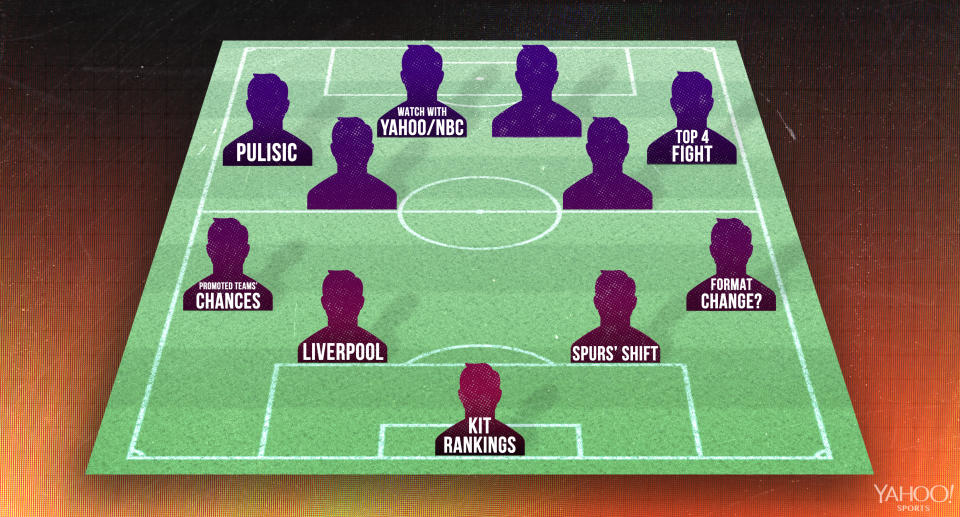Premier League preview: Is it time to change the relegation format?

Welcome to Yahoo Soccer’s Premier League Starting XI. This lineup of stories will get you ready for the upcoming season as we count down to kickoff on Friday.
On the final day of this Premier League season, NBC Sports will show all 10 simultaneous games across their network. While their coverage is unquestionably superb — and it serves as a wonderful opportunity to enjoy Watford on the Golf Channel — it tends to lack the drama of an event billed as “Championship Sunday.” Only a few games actually have anything at stake.
Despite the thrill ride last spring, the Premier League title is often decided before the final day, and there is typically only a single relegation spot remaining in Week 38. (Cardiff City claimed last season’s.)
There is currently no guarantee of drama on Championship Sunday. But there is a way to ensure a thrilling climax to the season: a relegation playoff.
Currently, the bottom three teams are automatically relegated and usurped by three teams from the Championship. One of those Championship teams comes up via a playoff, held between the four teams who place between third and sixth place.
While some European fans are sniffy about MLS playoffs, it’s a wildly popular format in the English second tier. The playoff final, a glitzy showpiece at Wembley stadium, is known as the “most lucrative game in soccer,” with a promotion prize estimated to be worth $215 million by Deloitte.
What if there was a way to combine the thrill of the Championship promotion playoffs and the unbearable tension of a relegation battle in a single format, all while producing the kind of bulbous revenue that makes things happen in this sport?

Believe it or not, it has actually been done before in England.
In 1987, playoffs across all four English professional tiers pitted a relegation-threatened side against three promotion hopefuls in a four-team format. That season, Charlton clung on to their top flight place by the tightest of margins, beating Leeds in extra time of a replay of the final.
The following season, Chelsea weren’t so lucky: They lost their First Division spot to Middlesbrough, in a tie that was marred by hooliganism at Stamford Bridge.
Alas, the relegation playoff system lasted only two seasons in England, and was duly replaced by the format we see today (whereby four teams from the same division vie for a spot). It may have been short lived, but it certainly shook things up.
The concept of a relegation playoff is, of course, by no means a thing of the past in Europe. Germany uses a slightly different format, where the team that finish 17th and 18th are relegated automatically, but the 16th-place team faces a two-leg playoff against the side that finishes third in the second tier, or 2. Bundesliga. The playoff was used between 1981 and 1991 before being reinstated for the 2008-09 season.
Last season, Union Berlin won promotion to the top flight for the first time in their history, defeating VFB Stuttgart over two legs on away goals. It was cruel for Stuttgart to drop, after technically going undefeated in the playoff, but this kind of underdog upset is undoubtedly a great narrative for the neutral fan.
Union Berlin’s surprise promotion marks only the third time that the lower league club has won the playoff since it was reintroduced — and the first time in eight years. Hamburger SV have the most experience of the playoff in recent years, surviving twice consecutively in 2014 and 2015, before dropping in the traditional manner three years later.
Critics of relegation playoffs may cite the German tendency for the higher-placed side to stay up, and the fact that the old English system effectively denies an extra playoff spot for a promotion hopeful.
But the benefits of Premier League relegation playoff far outweigh the drawbacks.
[ Follow Yahoo Soccer on Twitter and Facebook ]
For starters, it could serve as a vital lifeline for the team that finishes 18th in the top flight. Rather than dropping down with a last-day defeat to a stronger side, they can strive for one last chance of salvation, against a team that should, in theory, have a lesser stature.
Relegation is a costly business, which can cause nine-figure revenue drops, and spirals that some teams struggle to recover from for decades. (See former Premier League members Portsmouth and Wimbledon as cases in point.) Having one more chance to stay up could be absolutely vital for some.
A relegation playoff would also vet Championship teams and ensure their suitability for the step up. Using the German format last season, Cardiff would have faced Leeds United. Not only would Leeds have had a more direct shot at promotion (and arguably a better reward for finishing third), but they would have had the chance to prove their worthiness against top flight opposition. It would have been an initiation of sorts.
Perhaps the most compelling reason for the existence of a Premier League playoff, however, is its financial viability. Despite its incredible importance for the top flight, the current Championship playoff does not have much global commercial value. If it involved a Premier League team, it would have a more tangible impact, and therefore greater interest. This, in turn, would create the kind of massive revenue that has become the lifeblood of top teams. The playoff winner could be handsomely rewarded as a result.
If Germany can bring back the playoff format with great success, so can England. Whether it be the two-team Bundesliga format, or the four-team old English format, a relegation decider would provide a thrilling conclusion to the Premier League.
For one thing, it would certainly be a better finish than Watford on the Golf Channel.
Yahoo Soccer’s Premier League Starting XI



